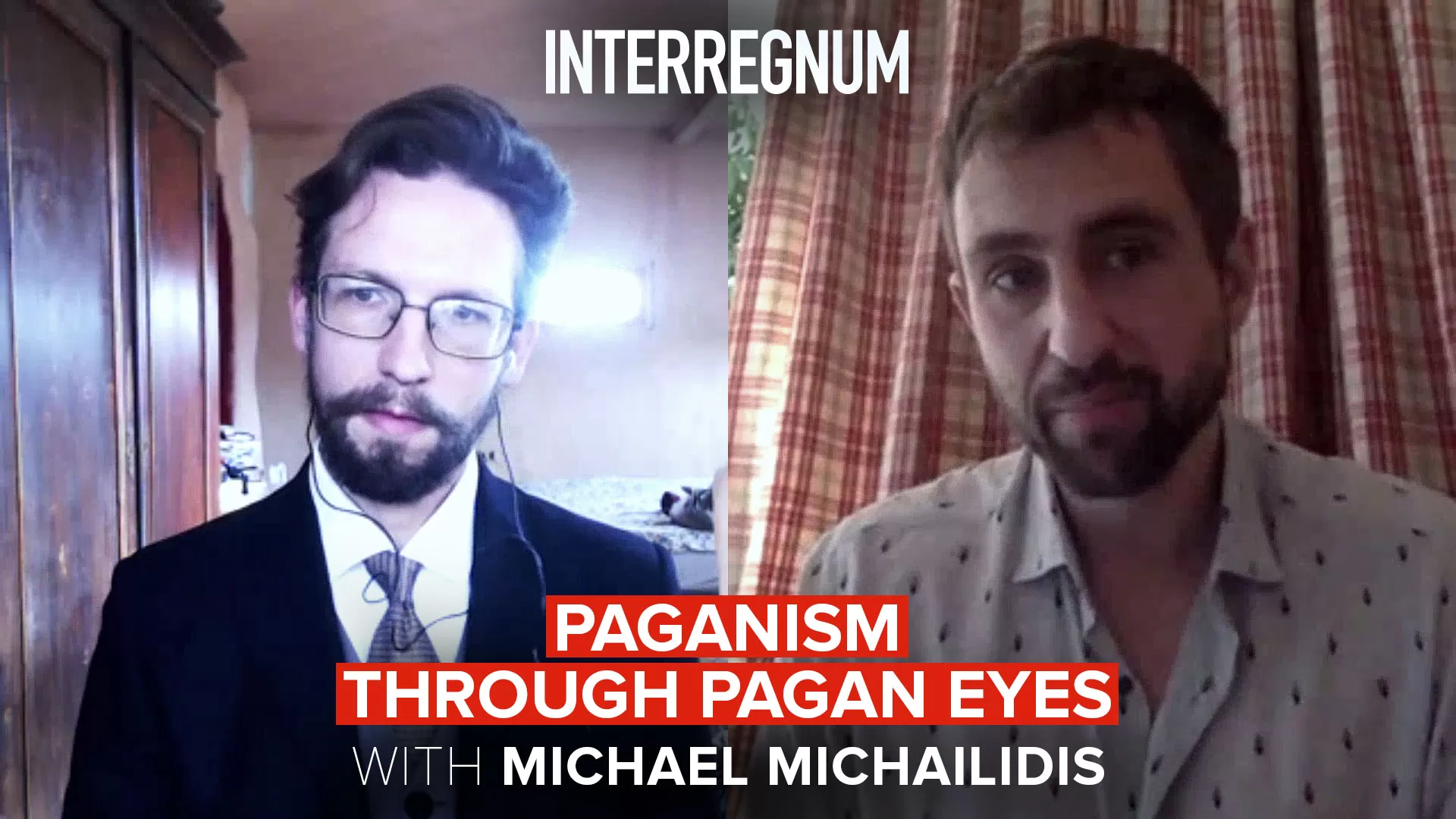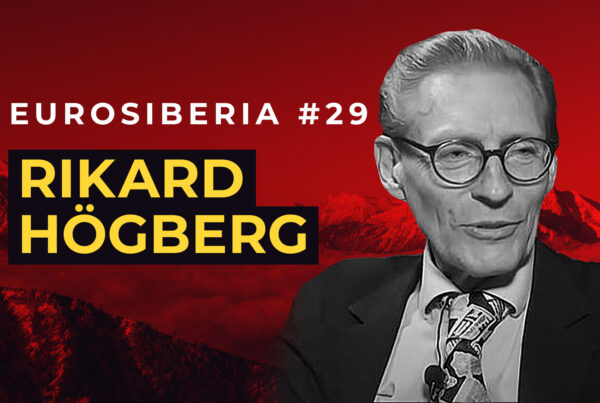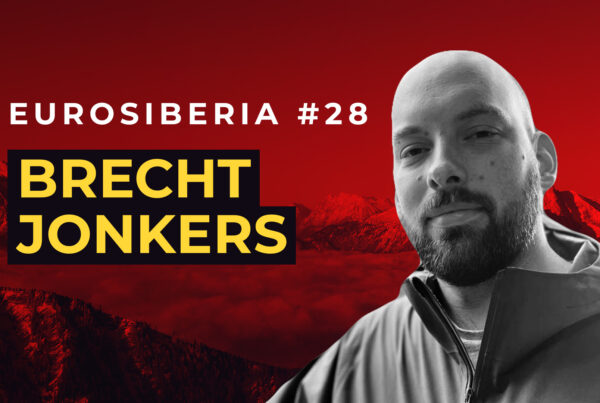Interregnum is joined by Michael Michailidis, who discusses the many aspects and ramifications of the pagan worldview in our understanding of history, our approach to Modernity, and our confrontation with our contemporary world. Join us for a vitalizing and penetrating conversation on our ancestral and cultural roots, and its relation to our philosophies, our politics, and our lives today.
The Arktos Restoration InitiativeWe have handpicked a few distinguished titles, previously lost to censorship, befitting any refined bookshelf. These esteemed classics are now offered in limited leather-bound editions, with a mere 100 copies per title. Owning one not only grants you a collector’s item but also supports our mission to restore them in paperback for all. Your contribution aids the metapolitical battle, ensuring that vital ideas and concepts remain accessible to an ever-expanding audience. | |||
|---|---|---|---|
| I |  $129.50 |  $99.50 | |








My card in Schmitt’s Typo Bingo has ‘move’, ‘mammoth’ and ‘subsidiary’ so far for the comment above.
I should have added one more thought that I originally hoped to get to. There should be, for the subtle thinker, no problem with the fact that common themes run through many cultural and religious expressions. There should be no problem for the Christian who is also a subtle thinker to entertain this any less. As for explaining this variation on themes as anticipatory or prefiguring movements in salvation history is fine with my Christian sensibilities, but in truth I am simply satisfied observing, noting and taking it all in as another yet-unsettled mystery. This is the stance of humility necessary for both faith and scientific inquiry. I do very much believe that the Virgin Mother of Christ is precisely the providential and perfected solution to that scary demonesses appearing in one of Michael’s videos and who will surely enough appear in Divorce Court opposite you, her husband, aiming to rob you of every penny that you have along with the children. How does one get to this miserable state? Just set your search image on the the “bad girl,” the experiential, live-in-the-moment girl. She’ll be living in the moment, too, when she gets feeling unfulfilled and calls a divorce lawyer. In complementary fashion, I would urge the many young men reading this to set your own discipline on track for a chaste early adulthood when you are in search of Mrs. Right. The image of the Virgin will serve you, your future family and society much better than the biker chick/witch—as fun as the letter seems to the young man especially when she gives you that seductive look. Men of Europe, young men, have an enormous task ahead of them. This should be exciting because it is also a heroic task that men of my era either missed through indolence, ignorance or oppression—or all three. It was an evil time and I would beg forgiveness for at least the men that with limited pre-knowledge or training fought the good fight as best as they could. We were the front line launching over the walls of the bunker. We had more than one arm tied behind our backs. Fortunately, many of us are now here, not to “tell you like it is,” as that simply would be arrogant and without basis. But we do have a few things that we learned the hard way. Learn from our loss and our follies. Take what you can from us. Think of us as antennae that you might benefit from in your groping in the dark. At least do not dismiss us as irrelevant, otherwise you will discover decades hence just how relevant that we all of a sudden became in retrospect. Your mission is going to be to rebuild civilization. You will do most of that by tending to the particulars of your life. I would humbly suggest, as the above more than hints at, that you focus not on pleasures and experiences, but rather building yourself up spiritually, mentally and physically. You will need to wrestle the economic engines back from the centralizers, the oligarchs, the usurers, the banksters, the thieves of every kind, the Hollywood corruptors and liars, the academics who are subversive to your mission as new husbands and wives of building your family, homestead and cities. You are going to have to fight like mad. You are going to have to be ruthless in weeding out your own ignorance and bad habits that your inherited through no fault of your own. Explosive anger will not do. Medicating your self with drugs, games and food will not do. You will have to fight smart. You will need to build enterprises–demand it! Say to hell with the enslaving plans to stuff you in work cubicles and trashy, burger-flipping jobs. Say hell no to their poisonous feminism and the sick assault on vibrant and fertile and productive masculinity and femininity—also grounded in family building. Learn how to make stuff. Find men who know how to build or make stuff, It could be farm equipment, trucks or fancy electronics. And use your brain, too. Use a damn dictionary. Make a dictionary your manly friend. Words are p-o-w-e-r. Master them. The sick culture has stripped you of even the attraction to intellectualism. channel your desire for “experiences” into complex and competent neural pathways. Experiences are to come secondarily, not as an object to be aimed at. Okay. Have a great day whatever day it is for you. (thanks Michael, I think upon reflection, it will become clearer that this was not as far off-topic as it might first seem.)
A very interesting interview. I looked at several of your videos, Michael. These were excellent videographic productions in support of your fertile thinking. incidentally, I was surprised that I so far have not heard at least the dropping of the name of Julian Jaynes and mention of his speculations regarding what he called the “breakdown of the bicameral mind.” On another familiar topic to John and me, I am still perplexed regarding this confusion of what I assert is a current political and economic misuse of the products and organization of scientific activity as if it were an intrinsic problem with “science.” This problem is, arguably, the activity of the financial oligarchs. Rather than speaking frequently of “scientism,” might I suggest that attention be directed instead to “bankism?” I would add that there still seems to be a reluctance to distinguish “scientism” and “science,” especially a fully considered science of the four causes. Your critique improves as you predicate your mention of science as “modern” science. Even there, it is not so much that even modern science is doing harm as are tricksters with other agendas, philosophical, religious, anti-religious, monetary and political. Indeed, banking is monetized politics in the hands of those that reject the four causes and Thomism. I hesitate to revisit this, but I do think that grave harm is done by suggesting the existence of fundamental, inherent categorical problems when a better description involves superficial perturbances of understanding and use of science by non-scientists or their scientific front men. That a debate by the Media go to-s of Sam Harris and Deepak Chopra was used as exemplary illustrates the problem. After all, what real authority do either of these men have on this topic? In the end, Michael, you pointed out the problem of this and John seemed to agree. But this was a strawman exercise that did not avail itself of the best sources on the relationship of science and religion, or science and other disciplines. I suggest that you or anyone who is interested in science’s place actually seek in practice the relationship of the scientific mode of thought with the religious, poetic, artistic and mystic. Integrate them, just do not do it in the corny way that sectarian, creationist polemicists attempt to do. No added chemicals are necessary for such adventures—in fact, chemicals are generally if not always deleterious. That this seems more difficult for some is no cause for embarrassment. We all struggle to bring the inchoately apprehended this side of the ineffable into the realm of understandable and expressible language. Language, spoken and textual, verbal and mathematical, is the solidification of experience with which one can converse and thereby create–or better yet, beget–new experiences and new being. (In stating this thusly, one might immediately think of the timeless mystery of the Trinitarian relationship.) Now as to John’s, perhaps disparaging remark about “reducing to mathematics,” I am delighted to mention that whenever I am glum or unsettled, I read some mathematics–even introductory selections from ‘Schaum’s Outline Series’, and I am lifted and propelled into a liberated–even contemplative–state of experience as the book slips off of my lap or is set aside. Scripture can do the same in a different way that includes a moral dimension and a dimension of love. I would suggest that it is adequate enough to note and warn that science and mathematics–like literature, law, chemicals, food, play and sex–can all be grievously misused. Now, what should quickly follow–though–is an emphatic demonstration of how these modes of thought can and should be used and properly integrated into a life of faith, virtue, craft, capacity, creativity, procreation, society, flourishing and experience. Summarizing this point, focus on what should be, not on the pathologies of abuse—especially when mention of the disordered itself becomes disordered and fails to be contextualized. I do have concern, Michael, regarding your claimed adoption of paganism as opposed to the exploration of an aristocratically more replete Christian world view. I understand that the initial and pedestrian stance of many Christians is that of a categorical and intransigent denunciation of every scholarly examination of difficult and easily misunderstood, or potentially misleading, topics. These situations more than anything involve the misplaced selection of certain settings for certain explorations and discussions. Learning this is not easy. Christian societies have a defensive role as one part of their identity. Defenders, not so much of the faith, but of the many, the many with different abilities to understand and to withstand, are also encapsulated by their own capacities—capacities that must be respected if one cares for the common good beyond one’s desire to explore new territories. I think you both recognize that catechetical admonitions may well serve to guide beginning and uncomplex Christians who are in different spiritual “places,” not merely at different stages of development. In truth, we all can be characterized according to our degree of complexity or simplicity—especially in relation to God or his angels. Some individual humans may be moving into different degrees of understanding, but others may never do so. Their map is complete and adequate for their purposes. This may not only be their choice, but God’s design as well. I thus use the term, ‘places’, rather than ‘levels’ to avoid the idea that sophistication is necessary for sanctity. Sanctity is the ‘sine qua non’. Sanctity, not intellect, is what Christianity hopes to provide in universal fashion. Subsidary to this, Christians may display many diffeent or new modes of cognitive being and understanding. Many, but not all, modes. For the Christian, there are “many mansions” to accommodate the many with their various attributes for experiencing and being while all can possess the holiness needed for eternal life. This combination of terms, ‘experiencing’ and ‘being’ is more than incidental. It is a combination that rescues being from some types of experiences that are not compatable with being. We need to have ‘essential’ experience as the end, even as we more toward the end. Being and experience must not contradict. Some experiences simply must be understood to be destructive of being—they are self-annihilating and cannot lead to joy. Back to our various Christians and their particular experiences, their many mansions towards which all of our hope is directed. Each mansion is infinitely good–albeit different. And each mansion allows a communion of visitation and conversation, if you will, by all of the saints in the beatific vision, a very unique type of conversation becoming pure act glorifying God himself. I think talk of Christianity as primarily about “rules” grossly misses and potentially misleads regarding the liberating nature and the promise of a joyful life offered by real Christianity. This incorrect understanding of christianity and rules seems to me to ignore the enormous body of Christian thought on every aspect of life, including the mystical. Perhaps I misunderstood you. Again, we run into the same problem that I detect with the presentation of scientific thought, especially in relation to the other aspects of human experience. Again, I am referring to the mistaking of misuse and abuse–or even simply restricted application of some part–as essential to some thing itself. Reduction is only one aspect of science, expansive entetainment of any experience is only one aspect of mystical religion. Both directions of thought–dissecting and combining–are necessary for science, religion and art. The generation of hypotheses, the postulating of super-systems in addition to subsystems and the creation of totally new fields of study are all aspects of anti-reduction, wholism, and conceptual assembly are essential for creating new disciplines. As an example of the latter, the future holds great promise for integrating many aspects of the mind-body elephant previously groped at, appendage by appendage, by isolated biological, physical, literary and religious disciplines. And here is where the previous discussion of science and today’s topic of developing and evolving experiential life converge. Only a few more quick notes might be helpful in order to keep this comment within its own need for boundaries. The indiscriminate divergence, or expansion, of experience carries with it the danger of psychical dissipation in perceptions and the danger of serious wickedness in thought and action. The existence of wickedness and the reality of its effects are well known, by some more than others. Such realms of evil can be generally assumed to be entered into by naivete and seduction. Michael, I did hear you refer to the importance of recognizing a dark side. I was a bit surprised by John’s pronunciation of Aleister Crowley’s abuse of drugs (and by implication, and sex) as not having had ill effects. Physiological, cognitive, social–and regrettably in Crowley’s mamoth case, civilizational–effects are profound consequences that emerge from careless neuropharmacological tampering. As a limited aside, who knows–too–what damage Crowley may have done to his vegetative and motor systems. Unleashing of bodily and mental powers when bypassing rational judgement immediately puts one in a condition of disarmament–even when employed by so-thoutght-of or self-styled “elevated adepts.” Humans are always only clever by half. ‘Corruptio ultima, pessima’. As one friend expressed it to me, one unwittingly appears on the radar screen of a myriad of predatory demons and is vulnerable to a disadvantageous asymmetry of information when forcibly exiting the solid ground of faith and rationality. Good never results. Crowley is the perfect example of why it is even more dangerous for all of us when the naturally talented, but always mortally flawed, hit upon what is merely enticing, seductive and necessarily a deceptive apple. And so how are we grounded and protected in the experiences permissible to prudent exploration? I noticed in those artistically well-done videos of yours, Michael, the absence of children and families. This was to me of great significance. The desire for liberalism (contrary to licit liberty) has always struck me as an argument for, to put it bluntly, licentious sex. This seems to be where we always go in such discussions and philosophizing. Without being much familiar with your ideas and trajectory, I will make the following remarks. Please counter if you believe that I am off the mark. The Christian life does offer all of the enduring and salutary experiences that a human needs and which avoids the digressive spinning off into that which is illusory, entrapping and destructively evil. The Christian life must necessarily involve soul making. I cannot conceive of anything greater than the delights of having children and educating them properly. The procreative act provides a couple with an exceedingly delightful experience that, within the safety of the welcomed uncertainty of conception, provides a means for ever more profound experiences of love. That the loss of this has had deleterious effects on Europe and all nations cannot be disputed, can it? That procreative uncertainty would ever be thought of as unwelcomed is an evil that is at the very heart of a misuse of science so rampant in modern times. The demands of childrearing and the inevitable pains of living are, for Christians wedded to time, space and matter, curiously liberating. Even the chaste or celibate Christian can participate in the development of children by education, catechesis and conversation. Conversation–indistinguishable from education in temporal life–is a highway to contemplation, the pinnacle of human being. Like the biological analog of begetting, the word itself can beget and create. And by “conversation,” I include texts—which are the potential beginning of new conversations. Thus, the married life, both in relationship of the spouses and the creation of children, is a channeling of much that is healthfully available for experiencing into one person as a spouse, and into children as new beings. From there, experiences can be disseminated more broadly and in ways that edify persons and society. In the end, there are only two worlds. All of religion, philosophy, economics and politics bifurcates here. Wrongful attempts to liberate by means of the demonic are always contraceptive. These willed actions sever esentials as a vasectomy severs the generative from the penetrative, the meaningful from the communicative. In the final analysis, there are only two stances and two kingdoms: the natalist and the anti-natalist, the human and the anti-human, the truly communicative and the deceptive. There is good and there is evil. There is the city of God and there is the city of man.